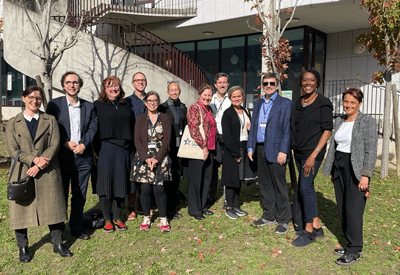
In October 2022, George Sabo, director of Global Initiatives, traveled to France with a delegation of representatives from U.S. institutions as part of the Fulbright International Education Administrators (IEA) Seminar to learn about the French higher education system, and explore new potential institutional connections for UC Santa Cruz.
The delegation was composed of representatives in leadership positions from nine other U.S. schools:
- University of Montana
- University of Maryland, Baltimore County
- University of Houston
- Sam Houston State University
- Georgia Institute of Technology
- Florida Atlantic University
- Boston University
- Marist College
- Lone Star College
The Franco-American Fulbright Commission in France organizes the two-week IEA Seminar each year in a different part of France. This year, the delegation traveled to visit institutions in the cities of Nantes and Angers in the Pays de la Loire region as well as several institutions in the greater Paris metropolitan area.
The delegation attended briefings, networked with institutional representatives, and engaged in campus tours to learn about the organization of France’s higher education system, its research priorities and funding structures, the support services institutions provide to international students and researchers, and the opportunities that exist for developing institutional partnerships in France.
“Meeting with representatives from a variety of institution types really helped me to better understand how higher education in France is organized, which is somewhat different from the U.S.”, said Sabo. “The insights I’ve gleaned from this experience will be immensely valuable to my work in helping to guide international partnership-building efforts at UCSC to enhance student and faculty mobility opportunities in the years ahead.”
During the Seminar, Sabo toured several public universities including the University of Nantes, University of Angers, and Paris-Saclay University as well as a host of other affiliated institutes (“Grandes Écoles”) and research labs focused in engineering disciplines (Centrale Nantes, IMT Atlantique, and the ParisTech consortium of schools – AgroParisTech, Arts et Métiers, ESPCI Paris, Chimie ParisTech, Mines ParisTech, Écoles des Ponts ParisTech, and Institut d’Optique), business and management (Audencia Business School) and social sciences (Sciences Po Saint-Germain en-Laye).
These Grandes Écoles, unique to the French higher education system, are a set of over 270 elite institutions throughout France, some with faculties no more populous than a typical, large American university academic department, that operate alongside, and sometimes in collaboration with the public universities. They specialize in three broad fields – engineering and sciences, economics and management, and literature/culture. They often award their own degrees, educate students in small classes, and carry out their own research agendas. Because the Grandes Écoles generally require a rigorous two-year study and entry examination process for admission, only about five percent of French higher education-bound students end up gaining admission to them each year. In many cases, these schools offer an education that is similarly affordable to public universities. French students typically pay very low fees for their studies, measuring them in the hundreds of Euros per year.
“I came away from this experience with a deeper respect for higher education in France and inspired to engage with institutions there for the benefit of our students and faculty. There are so many high-quality and affordable options for students, to study on an exchange, but also to engage in research experiences, or possibly even pursue a future graduate degree. In the months ahead, I intend to continue many of the conversations I started with my counterparts at these schools, and I hope to see many of these threads flourish into new partnerships with UCSC that will foster new opportunities for student and faculty mobility.”
Visits such as this are essential to building relationships with institutions abroad, and key to planning and developing innovative programs for students at UCSC.
If you have questions, or would like more information, please feel free to contact Director of Global Initiatives, George Sabo.
Broadening and deepening institutional partnerships with universities abroad is key to our Strategic Plan for Internationalization.
